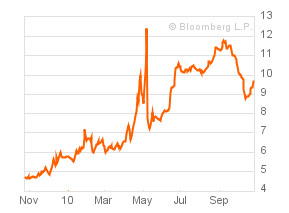Greek 10-year government bond yields, after having graced 8.73% merely a good week ago, are back with a vengeance (9.67%). Where is the insatiable demand for Greek bonds from China?
On October 22, Eurostat published revised Euro zone government deficit and debt figures for 2009. One country was missing – Greece: “Eurostat is not publishing Greek data in this News Release. Eurostat (…) is now undertaking a process of quality assessment of statistical source data from public accounts, in cooperation with the Greek Statistical Office and the Greek Court of Auditors. (…) Greek fiscal data will be published by Eurostat by mid November 2010.”
Last October (2009), the former Greek government estimated its budget deficit at 3.7% of GDP. Two weeks later the new government revised the number to 12.5%. By April 2010, the figure had been upped to 13.8%. Now, rumors of 15% are being thrown around. Yesterday, Bank of Greece threw oil into the fire by stating that Greek GDP will shrink 4% in 2010, and continue to shrink in 2011. Furthermore, the country had run out of “room for further tax increases”. To top it off, “delay in the collection of taxes may cause a shortfall of EUR 900m in 2010”.
Just when you thought it couldn’t get any worse, the CEO of the world’s largest bond fund manager PIMCO, Dr. Mohamed Abdulla El-Erian, says “Greece will default in three years” (10/25, 16:17 EST).
It took mere 17 minutes for some politician to call up the President of rating agency Standard & Poor’s and forcing him to state that “Greece will NOT default” (10/25, 16:33 EST).
Once European politicians had read their papers the next morning they felt compelled to try to extinguish the fire with words (EU’s Rehn: “Current debt problems of Euro-zone will be solved without debt restructuring”, ECB’s Quaden: “Restructuring of Greek debt is not on the table”, both 10/26).
Meanwhile, the always upbeat Greek PM Papandreou sounds a bit less enthusiastic, stating he is “concerned about Greece going forward”.
The Germans are suspiciously quiet. Could it be that Germany officially condemns the worst offender of the “stability treaty” of Maastricht, while at the same time still booking fat defense orders from the Greek army and navy? According to “Die Welt” (8/7/2010 – Sparen? Griechenland kauft lieber Waffen) Greece has spent some EUR 50bn over the last decade on defense. Per capita, it features Europe’s largest army. During the last five years, Greece has been among the top five purchasers of conventional weapons world-wide. No prize for guessing who builds those frigates and submarines (HDW, Blohm & Voss, Thyssen-Krupp Marine Systems).
Finally the question of “why” all this nonsense for a population of 6 million? You have 6,000 islands to defend, have been humiliated in Cyprus by Turkish invasion in 1974 and are paranoid about your NATO-partner. This makes you spend your last shirt on defense assets. And that is the main reason why Greece has not defaulted and exited the Euro yet – a weak new Drachma could afford even less Euro-priced military equipment and eventually lead to a decline in maritime power.
Unfortunately, a soon-to-be 150% debt-to-GDP ratio combined with 10% interest rates (or even 5% via EFSF – European Financial Stability Fund) makes a default virtually unavoidable. The interest payments alone would siphon 7.5% to 15% of GDP out of the economy – annually (of which three quarters will be leaving the country due to foreign ownership of Greek debt). There is no other solution. Trading olives and feta cheese for submarines is a losing proposition.
As written in previous posts, Greek default means Greek exit from the Euro zone (as punishment is the same, and only devaluation heals uncompetitive unit labor costs). Greek default and Euro exit means contagion. Contagion means mayhem in the Euro zone. Banks will lose money. The banks know it will happen. They just would like to dance a little bit longer.


